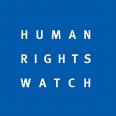Human Rights Watch
Human Rights Watch is a nonprofit, nongovernmental human rights organization established in 1978. Through an expert  network of human rights professionals comprising of lawyers, journalists and academics of diverse backgrounds, Human Rights Watch produces detailed reports on human rights conditions on a global scale. Each year, Human Rights Watch publishes more than 100 reports and briefings on human rights conditions in some 80 countries, while simulatenously generating extensive coverage in local and international media.
network of human rights professionals comprising of lawyers, journalists and academics of diverse backgrounds, Human Rights Watch produces detailed reports on human rights conditions on a global scale. Each year, Human Rights Watch publishes more than 100 reports and briefings on human rights conditions in some 80 countries, while simulatenously generating extensive coverage in local and international media.
With the leverage this brings, Human Rights Watch meets with governments, the United Nations , regional groups like the African Union and the European Union, financial institutions, and corporations to press for changes in policy and practice that promote human rights and justice around the world
History
Human Rights Watch began in 1978 with the creation of Helsinki Watch, designed to support the citizens groups formed throughout the Soviet bloc to monitor government compliance with the 1975 Helsinki Accords. Helsinki Watch adopted a methodology of publicly “naming and shaming” abusive governments through media coverage and through direct exchanges with policymakers.
Americas Watch was founded in 1981 while civil wars engulfed Central America. Americas Watch not only addressed abuses by government forces, but applied international humanitarian law to investigate and expose war crimes by rebel groups. In addition to raising its concerns in the affected countries, Americas Watch also critically examined the role played by foreign governments, particularly the United States, in providing military and political support to abusive regimes.
In rapid succession in the 1980s, Asia Watch (1985), Africa Watch (1988), and Middle East Watch (1989) were added to what was then known as “The Watch Committees.” In 1988, the organization formally adopted the all-inclusive name Human Rights Watch.
Reports on Women
Among its publications and interests are women’s rights. Since its origins, Human Rights Watch broadened and strengthened its work on the rights of women, children, refugees, and migrant workers, bringing a human rights perspective to such issues as domestic violence, trafficking, rape as a war crime, and child soldiers.
Access some recent related reports focusing on gender issues and specifically women’s rights abuses.
March 2012: “I had to run away” HRW Report
According to HRW, there are about 400 women and girls currently being held for moral crimes in Afghanistan, and they rarely can find support from authorities in a dysfunctional criminal justice system. In its report “I had to run away – The Imprisonment of Women and Girls for “Moral Crimes” in Afghanistan”, the group’s executive director, Kenneth Roth, calls on Afghan president Hamid Karzai to immediately release them. “President Karzai could simply issue an order and say that running away from domestic violence is not a crime, period.” Read more about the report here
External links
- “Soldiers Who Rape, Commanders Who Condone: Sexual Violence and Military Reform in the Democratic Republic of Congo” (July 16,2009)
- “Detained and dismissed: Women’s Struggle to Obtain Health Care in the United States Immigration Detention” (March 16, 2009)
- “Perpetual Minors: Human Rights Abuses Stemming from Male Guardianship and Sex Segregation in Saudi Arabia” (April 19 2008)
- “Hidden in the Mealie Meal: Gender-Based Abuses and Women’s HIV Treatment in Zambia (Dec. 18, 2007)
- “Help Wanted: Abuses against Female Migrant Domestic Workers in Indonesia and Malaysia” (July 21, 2004)


